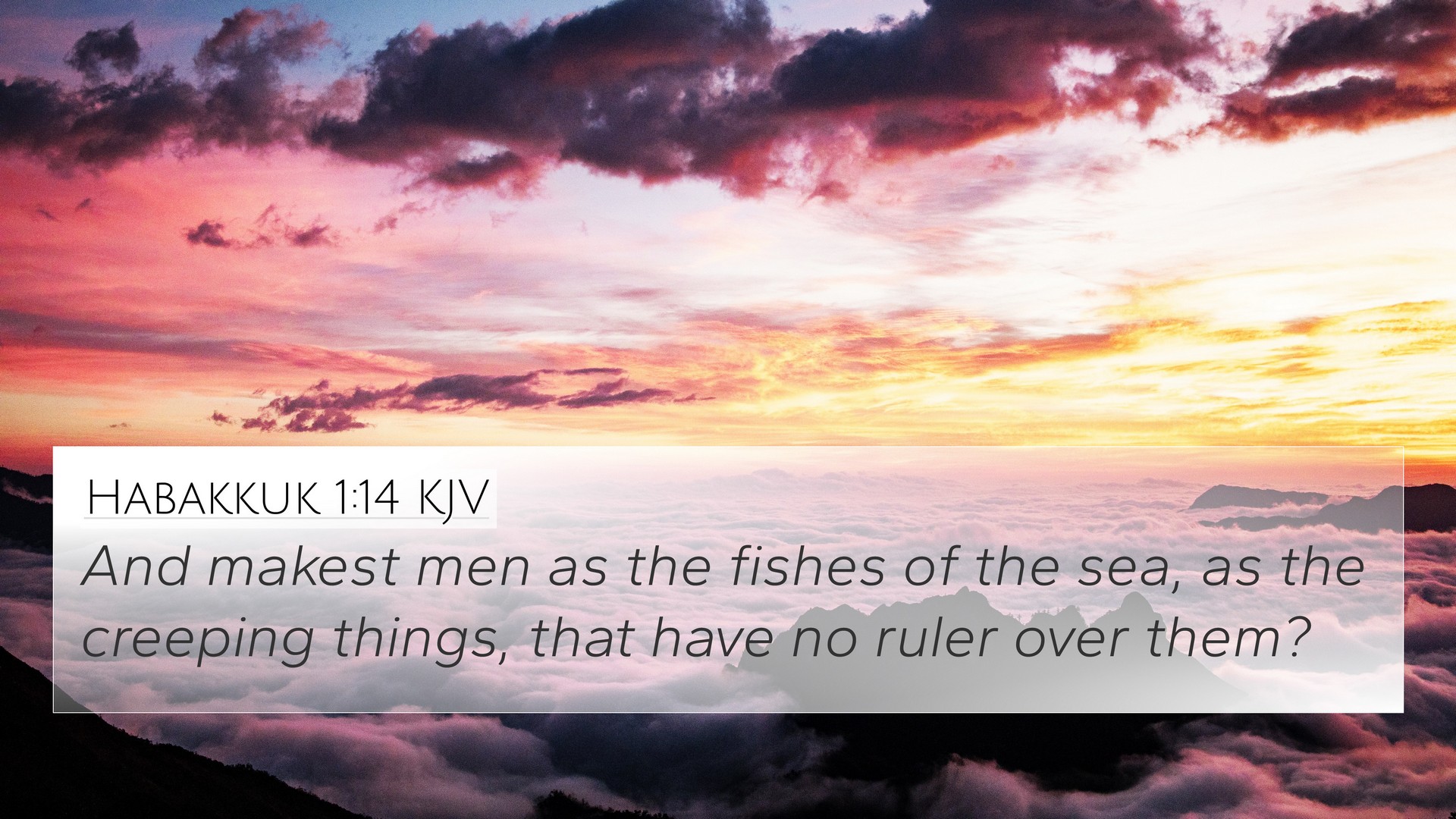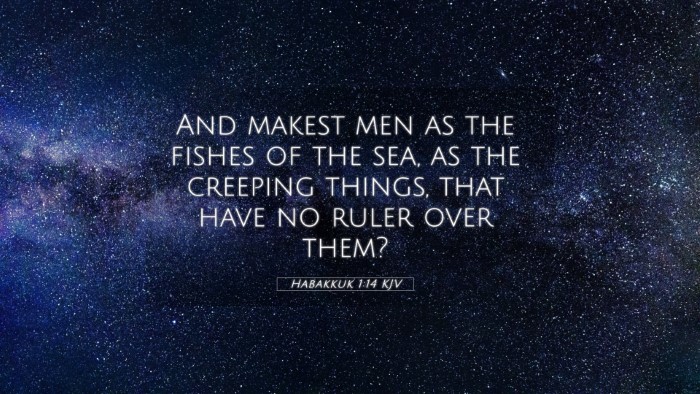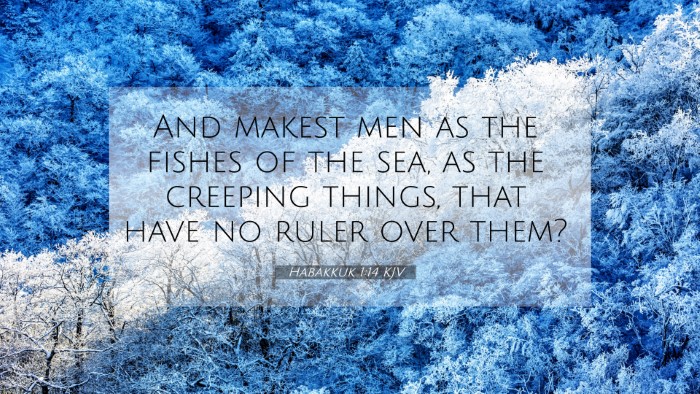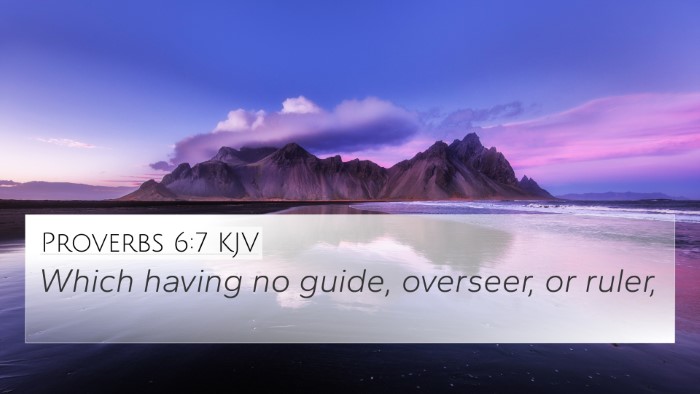Old Testament
Genesis Exodus Leviticus Numbers Deuteronomy Joshua Judges Ruth 1 Samuel 2 Samuel 1 Kings 2 Kings 1 Chronicles 2 Chronicles Ezra Nehemiah Esther Job Psalms Proverbs Ecclesiastes Song of Solomon Isaiah Jeremiah Lamentations Ezekiel Daniel Hosea Joel Amos Obadiah Jonah Micah Nahum Habakkuk Zephaniah Haggai Zechariah MalachiHabakkuk 1:14 Similar Verses
Habakkuk 1:14 Cross References
And makest men as the fishes of the sea, as the creeping things, that have no ruler over them?
Uncover the Rich Themes and Topics of This Bible Verse
Listed below are the Bible themes associated with Habakkuk 1:14. We invite you to explore each theme to gain deeper insights into the Scriptures.
Habakkuk 1:14 Cross Reference Verses
This section features a detailed cross-reference designed to enrich your understanding of the Scriptures. Below, you will find carefully selected verses that echo the themes and teachings related to Habakkuk 1:14 KJV. Click on any image to explore detailed analyses of related Bible verses and uncover deeper theological insights.
Habakkuk 1:14 Verse Analysis and Similar Verses
Understanding Habakkuk 1:14
Habakkuk 1:14 states: "And makest men as the fishes of the sea, as the creeping things, that have no ruler over them." This verse succinctly captures the perception of chaos and vulnerability within human existence, particularly in the face of oppressive forces. Looking deeper into this verse, we can uncover layers of meaning that enrich our understanding.
Verse Context and Meaning
In the context of the book of Habakkuk, the prophet expresses his distress over the injustice he sees around him. He is questioning why God allows wickedness to prosper while the righteous suffer. This particular verse metaphorically compares men to fish and creeping things, highlighting their lack of control and dominion over their circumstances.
Insights from Commentaries
-
Matthew Henry:
Henry suggests that this verse reflects the transient nature of human life. Just as fish in the sea are swept away without direction or protection, so too are humans vulnerable to the whims of powerful adversaries. This illustrates a deeper theological point about divine sovereignty and human frailty.
-
Albert Barnes:
Barnes emphasizes that the metaphor indicates a state of being ungoverned. He implies that society is in a state of moral disorder, with God's people unable to establish control over their plight. Barnes connects this to the larger theme of divine judgment and the eventual restoration of order and justice.
-
Adam Clarke:
Clarke notes that the imagery used by Habakkuk shows a lack of leadership and protection in the midst of chaos. He draws attention to the importance of acknowledging God's control, even when circumstances suggest otherwise. Clarke draws parallels between the helplessness of fish and humanity's need for divine governance.
Biblical Cross-References
To fully grasp the implications of Habakkuk 1:14, we can explore various cross-references that highlight similar themes of vulnerability and reliance on divine authority:
- Isaiah 57:20: Compares the wicked to the troubled sea, underscoring the chaos of ungodliness.
- Job 12:10: States that in God's hand is the life of every living thing, highlighting His sovereignty over creation.
- Psalms 104:25-26: Describes the vastness of God's creation, including creatures of the sea, pointing to His ultimate control.
- Ezekiel 47:9: Portrays a vision of abundance and life where there is previously chaos, indicating restoration through divine intervention.
- Matthew 10:31: Reinforces the idea of God's care for His creation, implying that humans are valued over the sparrows.
- Luke 12:6-7: Continues the theme of God’s concern for His creatures, illustrating the insignificance of worldly concerns.
- Proverbs 21:1: Affirms that the heart of the king is in the hand of the Lord, directing the course of human affairs as He pleases.
Thematic Connections in the Scriptures
This verse leads us to consider broader themes found throughout Scripture. Through comparative Bible verse analysis, we can identify connections between different passages that discuss divine sovereignty and human vulnerability:
- The Role of Leadership: Just as Habakkuk calls attention to the absence of rulers, many verses in the Bible emphasize the need for righteous leadership (e.g., Proverbs 29:2).
- The Nature of Justice: The disparity between the righteous and the wicked is a recurring concern in the Psalms (e.g., Psalm 73).
- The Assurance of Divine Care: Themes found in the New Testament echo God’s protective care for His followers (e.g., Romans 8:28).
Utilizing Cross-References for Biblical Understanding
Cross-referencing Biblical texts can help deepen your understanding of Habakkuk 1:14 and its implications. Here are a few tools and methods for effective cross-referencing:
- Bible Concordance: Use a concordance to find related verses based on keywords or themes.
- Bible Cross-Reference Guide: Utilize guides that specifically connect verses with similar contexts or meanings.
- Cross-Referencing Bible Study Methods: Engage in study methods that emphasize the connections between verses.
- Bible Chain References: Follow chain references in study Bibles to traverse through related scriptures seamlessly.
Final Thoughts
Habakkuk 1:14 illustrates profound truths about the nature of humanity and God's role as the Sovereign. As we explore the connections between Bible verses, we discover a rich tapestry woven through themes of justice, divine authority, and human vulnerability. This verse serves as a poignant reminder of our need for God's protective hand and the ultimate hope we find in Him.
Conclusion
In light of the insights gained from public domain commentaries and cross-referencing related scriptures, we can appreciate the depth of Habakkuk 1:14. The verse not only reflects individual struggles but also resonates within the broader narrative of scripture, providing comfort and understanding as we navigate the complexities of faith and existence.



